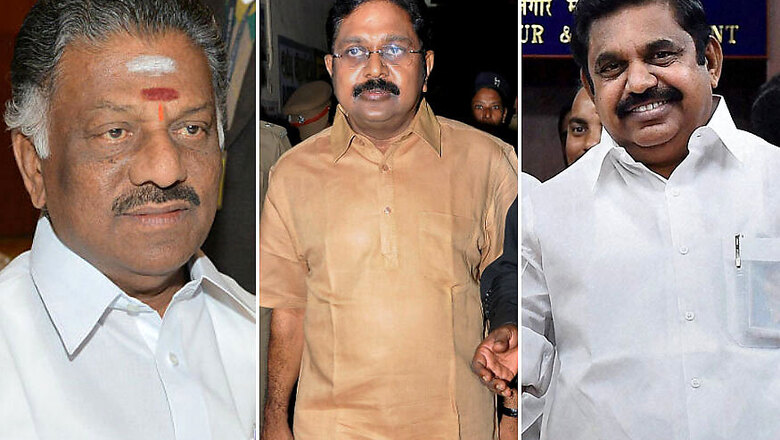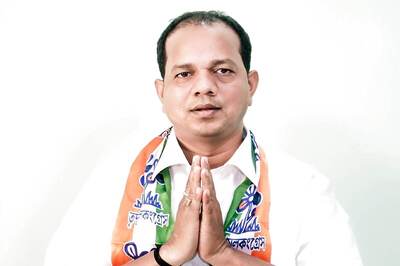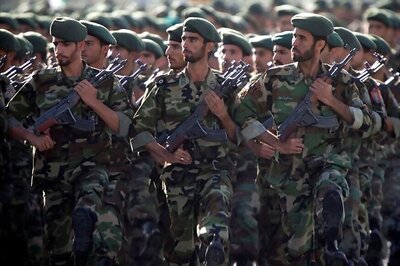
views
Chennai: Elections in Tamil Nadu have been mostly predictable for over two decades — a choice between the All India Anna Dravida Munnetra Kazhagam (AIADMK) and Dravida Munnetra Kazhagam (DMK), and usually, going against the present dispensation.
Between 1991 and 2016, the southern state had always voted out an incumbent government and brought in its rival party.
It was only in 2016, that the AIADMK was able to retain power after ruling for five years — its leader J Jayalalithaa keeping her popularity intact.
However, the public is at a cross-roads this election, having seen much factionalism within the AIADMK after Jayalalithaa’s death.
The pulse of the people is one of anger and loss of hope against the alternatives offered to them — in fact, many voters have even decided to either boycott the elections en masse or go for the NOTA (None of the Above) option.
Seventy-year-old Ranga Kumar, a Mylapore resident, has seen many a political drama unfold over the last two years since Jayalalithaa died.
“Since then, the (AIADMK) party is totally controlled by (Prime Minister) Modi. A vacuum has been created. The party doesn’t enjoy mass support and is unable to take decisions for the people of Tamil Nadu. Though Chief Minister Edappadi K Palaniswami and his deputy O Panneerselvam were able to inherit the legacies and party cadres, the TTV Dhinakaran factor is now going to split the votes within the AIADMK and this would be an advantage for the DMK,” Kumar says.
Another local, R Srinivasan, feels the AIADMK has lost its glory. “The party has lost its face in Tamil Nadu after Jayalalithaa’s demise. I lost respect for the party after the Koovathur incident (when several AIADMK MLAs were held hostage by Jaya’s close aide Sasikala at a resort in Koovathur on the outskirts of Chennai). The party should be moved out of power.”
The anger towards the AIADMK also stems from the fact that the party formed an alliance with the BJP — the Tamil voter isn’t used to parties from the north calling the shots in the southern state.
This is something that the DMK is cashing on in its campaigns and advertisements. “We don’t need hegemonic forces. We don’t need slaves,” reads one of the DMK ads that splashed in all newspapers across the state.
However, while the DMK tries to appear to hold its ground when it comes to resisting Delhi’s intervention, it isn’t completely immune from influences either — till now, party president MK Stalin is the only leader to have endorsed Congress president Rahul Gandhi as a prime ministerial candidate.
Though the DMK has also suffered the death of its founder and five-time chief minister M Karunanidhi, it hasn’t seen any instability thereafter.
The claim to the leadership mantle, made by Karunanidhi’s elder son MK Alagiri, was nipped before the DMK patriarch’s death.
Stalin is very much in control as the party chief. However, the party leadership is aware that this is the first election that the party is facing without the ‘Kalaignar’.
Professor Tamizh Selvi says, “There is no one individual who can take the lead and follow the footsteps of these two leaders. Of course, Stalin has been in politics since the age of 14. But his approach gives us a feeling that we cannot predict what his decision is going to be in future.”
“Stalin has been under the shadow of the ‘Kalaignar’. We haven’t seen him take any major decision on his own as yet. Since the DMK was seen as Karunandhi’s party for a long time, the party had no other emerging leader,” said M Subramani, a post-graduate student.
In the absence of a single pan-Tamil Nadu mass leader, the state is now a fragmented polity. Regionalism has taken hold with politicians behaving like local chieftains.
Palaniswami is said to be lording over the western part of the state, while Dhinakaran, the rebel leader and nephew of Sasikala, who launched his own party last year, hopes to do well in the southern districts. Stalin is betting on northern Tamil Nadu.
N Sathiyamoorthy, a political observer, says the current alignments are similar to the scenario in 1998-99, when Karunanidhi and Jayalalithaa called the shots.
“Twenty years later, we are back there. Even if one of them were here, it might have made a difference. They are both absent from the scene at the same time, and it means that barring the charisma quotient at equitable levels, nothing much has changed. Stalin had quelled Alagiri’s rebellion even when Karunanidhi was around, and with his blessing. Dhinakaran is a thorn for the AIADMK, but there again, EPS has firmly established himself despite visible electoral inadequacies.”
Tamil Nadu has always given a decisive mandate. But with so many new players around, a section of the voters is still undecided on which party to vote for.
“This is the first time I haven’t decided which party to vote for. Usually I take a call ahead of the elections, but this time, I’m confused. Many miss the two legendary leaders,” says Samyukta Sridhar, a corporate professional and voter for many years.
“I was always clear about which party would provide good governance for people. But with all the developments in the state since December 2016, I don’t know who would be a better choice,” says Iniyan M, a college student.



















Comments
0 comment